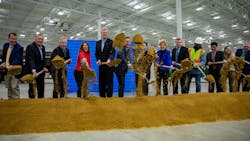MBTA breaks ground on Quincy bus garage; highlights expected federal investment from infrastructure package
State and transit officials broke ground on the Massachusetts Bay Transportation Authority’s (MBTA) new Quincy Bus Maintenance Facility and highlighted how the expected funding from the Bipartisan Infrastructure Law (BIL) would positively impact MBTA’s system.
“We are here to celebrate in Quincy because this new bus maintenance facility represents the kind of meaningful capital investments that the Baker-Polito Administration and MBTA can and will make to improve reliability and service throughout the network with these resources,” said Massachusetts Department of Transportation Secretary and CEO Jamey Tesler. “The MBTA’s fleet and facility modernization decisions are not made in isolation, but as an integrated strategy to help us achieve our greater goals which include increasing the fleet size and pursuing a bus network redesign that meets the needs of a growing and changing ridership, with a focus on equity, service, reliability and sustainability.”
The existing Quincy Bus Maintenance Facility is the oldest in MBTA’s system and lacks the technology and space required to support new buses. MBTA first introduced battery-electric prototypes into its fleet in 2019.
The new facility, which is located within a mile of where many Quincy bus routes begin at the Quincy Center Station, will accommodate up to 120 battery-electric buses and will allow for potential service expansion.
MBTA plans to replace nine of its bus maintenance facilities to accommodate battery-electric vehicles and related infrastructure. The authority plans to invest $100 million annually to build its zero-emission fleet, dependent on when facilities are ready to accommodate the new vehicles.
The MBTA says it anticipates drawing on multiple funding sources to construct the Quincy Bus Maintenance Facility that are both MBTA and federal sources, including federal formula funds increased and authorized under the BIL, as well as potentially one of the competitive federal grants.
Impact of the BIL on MBTA
Massachusetts anticipates receiving more than $9.5 billion over five years, including an increase in the re-authorization of federal transportation dollars from the BIL. Of this amount, MBTA expects to receive $2.2 billion over five years that will fund $1.6 billion in spending already programed and $580 million for new projects.
“The Bipartisan Infrastructure Law will deliver billions in funding to the commonwealth, helping to continue to support the investments our administration has made to the MBTA to provide critical capital improvements that make the system more reliable and resilient,” said Massachusetts Gov. Charlie Baker. “We are grateful for the efforts of the congressional delegation to secure this funding for Massachusetts, and we look forward to delivering more projects like this one across the state.”
As programmed in the current State Transportation Improvement Program (STIP), the MBTA plans to invest $2 billion, including state and MBTA matching funds, over the next five years in a variety of projects. These include $852 million for vehicles, $412 million for stations and facilities (including the Quincy Bus Maintenance Facility), $295 million for bridges and tunnels and $428 million for signal and system upgrades.
MBTA says it is currently reviewing options for investing the $580 million in the BIL’s additional formula funding and expects most of these funds will go to State of Good Repair projects including funding for projects that are currently only partially paid for in the existing STIP.
The MBTA is also developing a strategy for reviewing and competing for discretionary funding opportunities. This strategy will continue to be refined as further details are provided by the federal government. Projects for which such funding might be sought could include, but are not limited to: bus electrification, dedicated bus lanes, Core Capacity-eligible investments, the Arborway Bus Facility, station accessibility improvements, reconstruction of the Southwest Corridor portion of the Orange Line, double tracking commuter rail lines, commuter rail electrification early action investments, commuter rail additional vehicle replacements to reduce the MBTA’s carbon footprint and drawbridge replacements.
“As we build a better T for our riders, the BIL will give us additional momentum by delivering $2.2 billion in MBTA formula funds over the next 5 years with $1.6 billion in spending already programmed and $580 million intended for new projects,” said MBTA General Manager Steve Poftak. “We’re grateful to the Baker-Polito Administration and the delegation who brought these BIL funds to the T, which will support critical improvements like the new Quincy bus facility, as well as our state and local partners whose collaboration makes these kinds of important projects possible. We believe providing modern, reliable service is imperative now more than ever as we move beyond the pandemic, and this funding is instrumental in helping us accelerate improvements over the next five years and build a better T more quickly.”
About the Author

Mischa Wanek-Libman
Group Editorial Director
Mischa Wanek-Libman is director of communications with Transdev North America. She has more than 20 years of experience working in the transportation industry covering construction projects, engineering challenges, transit and rail operations and best practices.
Wanek-Libman has held top editorial positions at freight rail and public transportation business-to-business publications including as editor-in-chief and editorial director of Mass Transit from 2018-2024. She has been recognized for editorial excellence through her individual work, as well as for collaborative content.
She is an active member of the American Public Transportation Association's Marketing and Communications Committee and served 14 years as a Board Observer on the National Railroad Construction and Maintenance Association (NRC) Board of Directors.
She is a graduate of Drake University in Des Moines, Iowa, where she earned a Bachelor of Arts degree in Journalism and Mass Communication.
